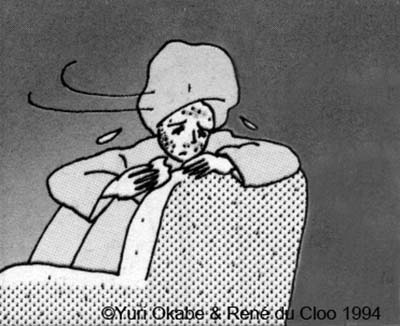Though acne can generally be cured with proper management, there are cases that are unresponsive to standard treatments. Isotretinoin (Accutane®, Roaccutane®), an oral medication with a cure rate of 95%, is regarded as the last resort for such cases. Isotretinoin is a vitamin A derivative. It has a regulatory effect on the turnover of the epidermis (surface layer of the skin), thus counteracting follicular plugging, induces a marked reduction in sebum secretion, and suppresses inflammation as "immunomodulator".
The downside of isotretinoin is its many and potentially severe side effects. Well-known are birth defects highly frequent in babies born from mothers taking isotretinoin. Women who are pregnant or trying to get pregnant are not eligible for this treatment, and female patients must use contraception while on isotretinoin and until one month after its discontinuation. Since certain side effects such as elevated lipid levels, reduced numbers of blood cells and liver dysfunction do not become manifest as subjective symptoms, periodical (usually monthly) blood tests are mandatory. Abnormal laboratory findings encountered most often are increased levels of triglycerides and cholesterol, which need be closely monitored.
Common side effects are skin symptoms, such as dryness of skin and mucous membranes (especially lips), redness, sun sensitivity, eczema and skin infections.
General symptoms like fatigue and muscle and joint pain may be observed.

isotretinoin
Depression and other mental problems have been reported. Although rare, severe headaches possibly attributed to an elevated intracranial pressure, disturbed vision or hearing impairment could result in a referral to a specialist.Most of these side effects disappear rapidly once the medication is discontinued.
Transient acne flare-ups are not rare when one starts the medicine or increases the dosage, and resolve within a few weeks. Topical antibiotic agents for new acne and management of dryness and other skin symptoms may be necessary. Combining isotretinoin with other medications is basically neither required nor desired. For instance, taken together, oral antibiotics (-cyclines) could cause a serious side effect.
The dosage is based on the patient's weight and reaction. The chance of recurrence depends on the cumulative dose. The course generally requires 4 to 6 months.
Isotretinoin is especially recommended to acne patients, often with allergic constitution, who tend to experience excessive inflammation followed by severe scarring. While it is useful for scar prevention, one should keep in mind that no skin surgery or other aggressive procedures, including scar revision, can be performed for 6 months after its discontinuation.
Total cost including consultations, laboratory tests and medications is from ¥400,000